Research Report: Social Media Advertising Influence on Buyer Behaviour
VerifiedAdded on 2022/10/02
|8
|1847
|25
Report
AI Summary
This report delves into the dynamic relationship between social media advertising and consumer buying behavior. It begins by establishing the importance of social media in modern marketing, highlighting the shift from traditional marketing methods to digital platforms and the resulting changes in consumer behavior. The research rationale emphasizes the need to understand how social media marketing strategies influence consumer purchase decisions. A literature review examines existing studies on the topic, including the impact of online communities, brand image, and consumer perceptions. The report identifies key research problems, such as the challenges organizations face in content creation, measurement, distribution, and community management on social media. The research question focuses on how social media advertising influences consumer buying behavior and its various elements. An appendix includes a team charter outlining the project's scope, timeline, resource allocation, and team expectations. The report aims to provide insights into the effects of social media on consumer behavior and offers a comprehensive overview of the research process.
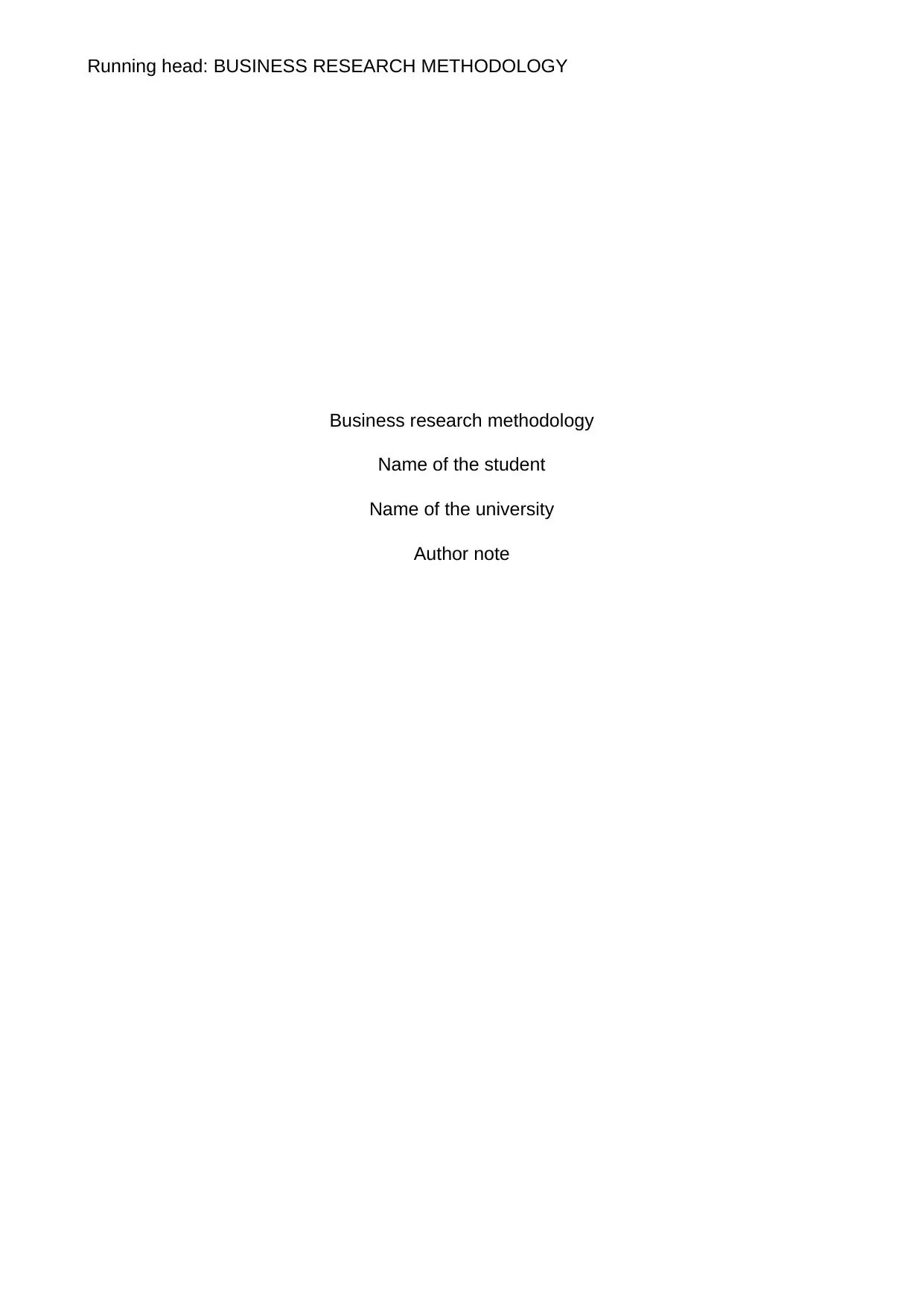
Running head: BUSINESS RESEARCH METHODOLOGY
Business research methodology
Name of the student
Name of the university
Author note
Business research methodology
Name of the student
Name of the university
Author note
Paraphrase This Document
Need a fresh take? Get an instant paraphrase of this document with our AI Paraphraser
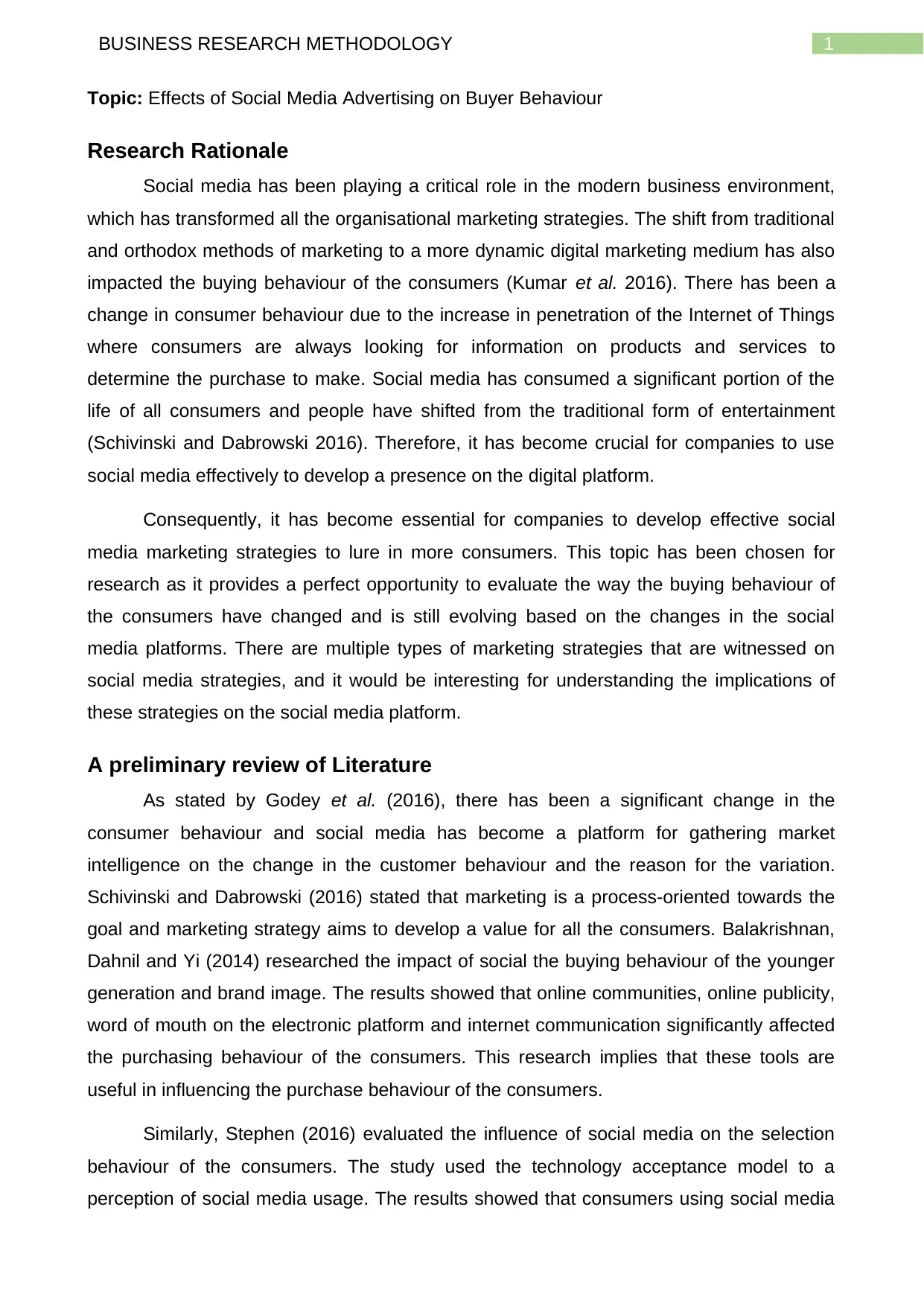
1BUSINESS RESEARCH METHODOLOGY
Topic: Effects of Social Media Advertising on Buyer Behaviour
Research Rationale
Social media has been playing a critical role in the modern business environment,
which has transformed all the organisational marketing strategies. The shift from traditional
and orthodox methods of marketing to a more dynamic digital marketing medium has also
impacted the buying behaviour of the consumers (Kumar et al. 2016). There has been a
change in consumer behaviour due to the increase in penetration of the Internet of Things
where consumers are always looking for information on products and services to
determine the purchase to make. Social media has consumed a significant portion of the
life of all consumers and people have shifted from the traditional form of entertainment
(Schivinski and Dabrowski 2016). Therefore, it has become crucial for companies to use
social media effectively to develop a presence on the digital platform.
Consequently, it has become essential for companies to develop effective social
media marketing strategies to lure in more consumers. This topic has been chosen for
research as it provides a perfect opportunity to evaluate the way the buying behaviour of
the consumers have changed and is still evolving based on the changes in the social
media platforms. There are multiple types of marketing strategies that are witnessed on
social media strategies, and it would be interesting for understanding the implications of
these strategies on the social media platform.
A preliminary review of Literature
As stated by Godey et al. (2016), there has been a significant change in the
consumer behaviour and social media has become a platform for gathering market
intelligence on the change in the customer behaviour and the reason for the variation.
Schivinski and Dabrowski (2016) stated that marketing is a process-oriented towards the
goal and marketing strategy aims to develop a value for all the consumers. Balakrishnan,
Dahnil and Yi (2014) researched the impact of social the buying behaviour of the younger
generation and brand image. The results showed that online communities, online publicity,
word of mouth on the electronic platform and internet communication significantly affected
the purchasing behaviour of the consumers. This research implies that these tools are
useful in influencing the purchase behaviour of the consumers.
Similarly, Stephen (2016) evaluated the influence of social media on the selection
behaviour of the consumers. The study used the technology acceptance model to a
perception of social media usage. The results showed that consumers using social media
Topic: Effects of Social Media Advertising on Buyer Behaviour
Research Rationale
Social media has been playing a critical role in the modern business environment,
which has transformed all the organisational marketing strategies. The shift from traditional
and orthodox methods of marketing to a more dynamic digital marketing medium has also
impacted the buying behaviour of the consumers (Kumar et al. 2016). There has been a
change in consumer behaviour due to the increase in penetration of the Internet of Things
where consumers are always looking for information on products and services to
determine the purchase to make. Social media has consumed a significant portion of the
life of all consumers and people have shifted from the traditional form of entertainment
(Schivinski and Dabrowski 2016). Therefore, it has become crucial for companies to use
social media effectively to develop a presence on the digital platform.
Consequently, it has become essential for companies to develop effective social
media marketing strategies to lure in more consumers. This topic has been chosen for
research as it provides a perfect opportunity to evaluate the way the buying behaviour of
the consumers have changed and is still evolving based on the changes in the social
media platforms. There are multiple types of marketing strategies that are witnessed on
social media strategies, and it would be interesting for understanding the implications of
these strategies on the social media platform.
A preliminary review of Literature
As stated by Godey et al. (2016), there has been a significant change in the
consumer behaviour and social media has become a platform for gathering market
intelligence on the change in the customer behaviour and the reason for the variation.
Schivinski and Dabrowski (2016) stated that marketing is a process-oriented towards the
goal and marketing strategy aims to develop a value for all the consumers. Balakrishnan,
Dahnil and Yi (2014) researched the impact of social the buying behaviour of the younger
generation and brand image. The results showed that online communities, online publicity,
word of mouth on the electronic platform and internet communication significantly affected
the purchasing behaviour of the consumers. This research implies that these tools are
useful in influencing the purchase behaviour of the consumers.
Similarly, Stephen (2016) evaluated the influence of social media on the selection
behaviour of the consumers. The study used the technology acceptance model to a
perception of social media usage. The results showed that consumers using social media
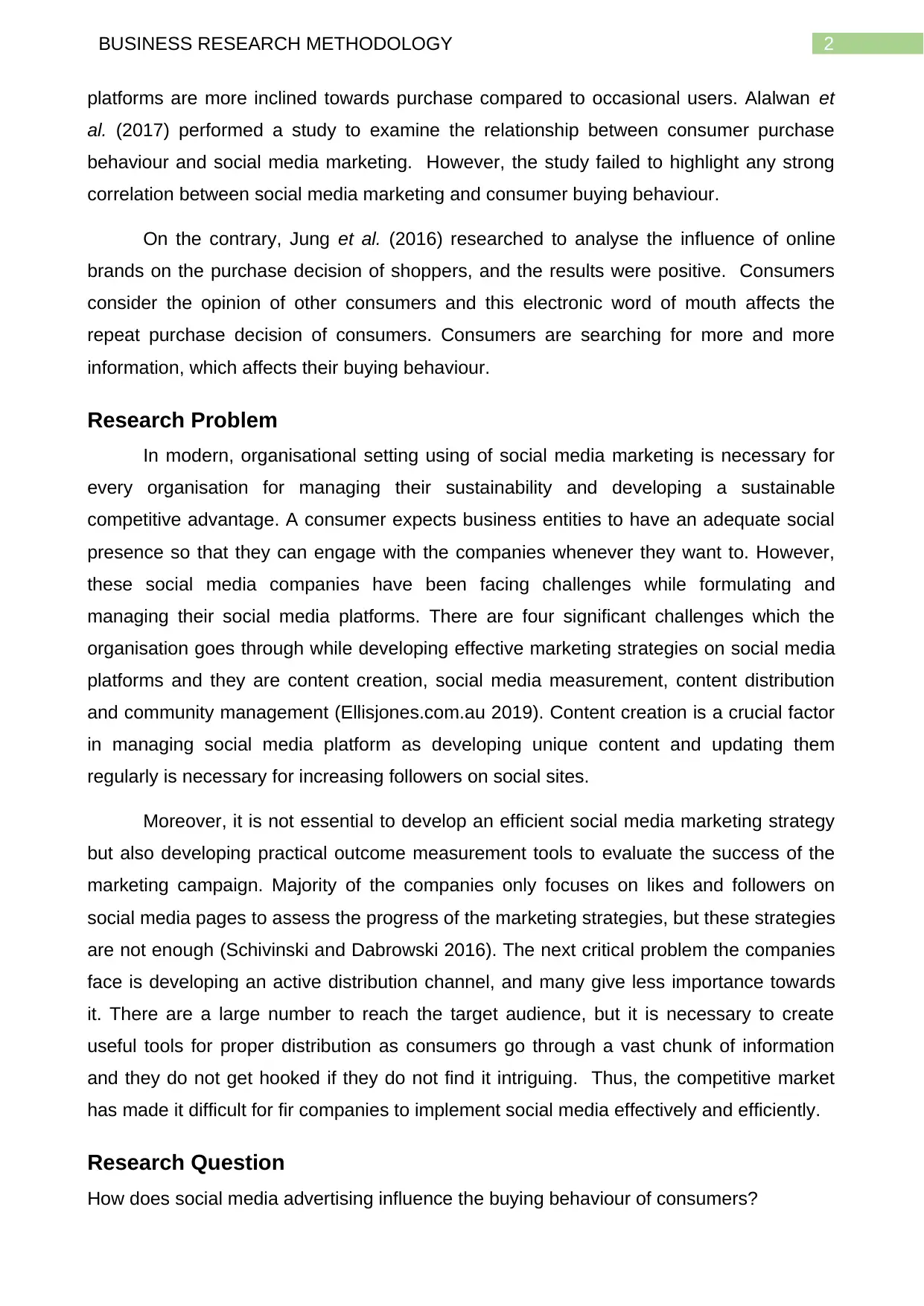
2BUSINESS RESEARCH METHODOLOGY
platforms are more inclined towards purchase compared to occasional users. Alalwan et
al. (2017) performed a study to examine the relationship between consumer purchase
behaviour and social media marketing. However, the study failed to highlight any strong
correlation between social media marketing and consumer buying behaviour.
On the contrary, Jung et al. (2016) researched to analyse the influence of online
brands on the purchase decision of shoppers, and the results were positive. Consumers
consider the opinion of other consumers and this electronic word of mouth affects the
repeat purchase decision of consumers. Consumers are searching for more and more
information, which affects their buying behaviour.
Research Problem
In modern, organisational setting using of social media marketing is necessary for
every organisation for managing their sustainability and developing a sustainable
competitive advantage. A consumer expects business entities to have an adequate social
presence so that they can engage with the companies whenever they want to. However,
these social media companies have been facing challenges while formulating and
managing their social media platforms. There are four significant challenges which the
organisation goes through while developing effective marketing strategies on social media
platforms and they are content creation, social media measurement, content distribution
and community management (Ellisjones.com.au 2019). Content creation is a crucial factor
in managing social media platform as developing unique content and updating them
regularly is necessary for increasing followers on social sites.
Moreover, it is not essential to develop an efficient social media marketing strategy
but also developing practical outcome measurement tools to evaluate the success of the
marketing campaign. Majority of the companies only focuses on likes and followers on
social media pages to assess the progress of the marketing strategies, but these strategies
are not enough (Schivinski and Dabrowski 2016). The next critical problem the companies
face is developing an active distribution channel, and many give less importance towards
it. There are a large number to reach the target audience, but it is necessary to create
useful tools for proper distribution as consumers go through a vast chunk of information
and they do not get hooked if they do not find it intriguing. Thus, the competitive market
has made it difficult for fir companies to implement social media effectively and efficiently.
Research Question
How does social media advertising influence the buying behaviour of consumers?
platforms are more inclined towards purchase compared to occasional users. Alalwan et
al. (2017) performed a study to examine the relationship between consumer purchase
behaviour and social media marketing. However, the study failed to highlight any strong
correlation between social media marketing and consumer buying behaviour.
On the contrary, Jung et al. (2016) researched to analyse the influence of online
brands on the purchase decision of shoppers, and the results were positive. Consumers
consider the opinion of other consumers and this electronic word of mouth affects the
repeat purchase decision of consumers. Consumers are searching for more and more
information, which affects their buying behaviour.
Research Problem
In modern, organisational setting using of social media marketing is necessary for
every organisation for managing their sustainability and developing a sustainable
competitive advantage. A consumer expects business entities to have an adequate social
presence so that they can engage with the companies whenever they want to. However,
these social media companies have been facing challenges while formulating and
managing their social media platforms. There are four significant challenges which the
organisation goes through while developing effective marketing strategies on social media
platforms and they are content creation, social media measurement, content distribution
and community management (Ellisjones.com.au 2019). Content creation is a crucial factor
in managing social media platform as developing unique content and updating them
regularly is necessary for increasing followers on social sites.
Moreover, it is not essential to develop an efficient social media marketing strategy
but also developing practical outcome measurement tools to evaluate the success of the
marketing campaign. Majority of the companies only focuses on likes and followers on
social media pages to assess the progress of the marketing strategies, but these strategies
are not enough (Schivinski and Dabrowski 2016). The next critical problem the companies
face is developing an active distribution channel, and many give less importance towards
it. There are a large number to reach the target audience, but it is necessary to create
useful tools for proper distribution as consumers go through a vast chunk of information
and they do not get hooked if they do not find it intriguing. Thus, the competitive market
has made it difficult for fir companies to implement social media effectively and efficiently.
Research Question
How does social media advertising influence the buying behaviour of consumers?
⊘ This is a preview!⊘
Do you want full access?
Subscribe today to unlock all pages.

Trusted by 1+ million students worldwide
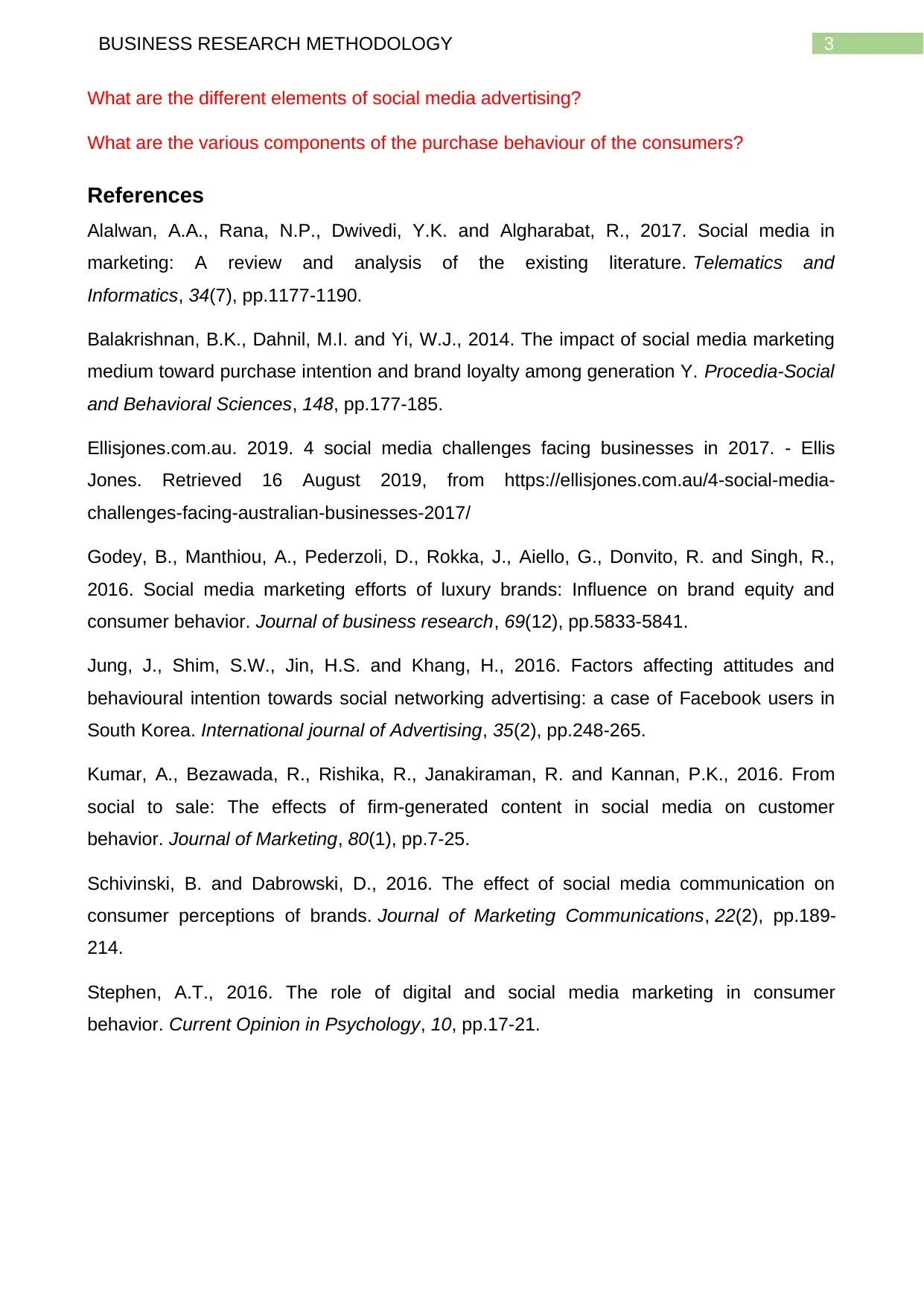
3BUSINESS RESEARCH METHODOLOGY
What are the different elements of social media advertising?
What are the various components of the purchase behaviour of the consumers?
References
Alalwan, A.A., Rana, N.P., Dwivedi, Y.K. and Algharabat, R., 2017. Social media in
marketing: A review and analysis of the existing literature. Telematics and
Informatics, 34(7), pp.1177-1190.
Balakrishnan, B.K., Dahnil, M.I. and Yi, W.J., 2014. The impact of social media marketing
medium toward purchase intention and brand loyalty among generation Y. Procedia-Social
and Behavioral Sciences, 148, pp.177-185.
Ellisjones.com.au. 2019. 4 social media challenges facing businesses in 2017. - Ellis
Jones. Retrieved 16 August 2019, from https://ellisjones.com.au/4-social-media-
challenges-facing-australian-businesses-2017/
Godey, B., Manthiou, A., Pederzoli, D., Rokka, J., Aiello, G., Donvito, R. and Singh, R.,
2016. Social media marketing efforts of luxury brands: Influence on brand equity and
consumer behavior. Journal of business research, 69(12), pp.5833-5841.
Jung, J., Shim, S.W., Jin, H.S. and Khang, H., 2016. Factors affecting attitudes and
behavioural intention towards social networking advertising: a case of Facebook users in
South Korea. International journal of Advertising, 35(2), pp.248-265.
Kumar, A., Bezawada, R., Rishika, R., Janakiraman, R. and Kannan, P.K., 2016. From
social to sale: The effects of firm-generated content in social media on customer
behavior. Journal of Marketing, 80(1), pp.7-25.
Schivinski, B. and Dabrowski, D., 2016. The effect of social media communication on
consumer perceptions of brands. Journal of Marketing Communications, 22(2), pp.189-
214.
Stephen, A.T., 2016. The role of digital and social media marketing in consumer
behavior. Current Opinion in Psychology, 10, pp.17-21.
What are the different elements of social media advertising?
What are the various components of the purchase behaviour of the consumers?
References
Alalwan, A.A., Rana, N.P., Dwivedi, Y.K. and Algharabat, R., 2017. Social media in
marketing: A review and analysis of the existing literature. Telematics and
Informatics, 34(7), pp.1177-1190.
Balakrishnan, B.K., Dahnil, M.I. and Yi, W.J., 2014. The impact of social media marketing
medium toward purchase intention and brand loyalty among generation Y. Procedia-Social
and Behavioral Sciences, 148, pp.177-185.
Ellisjones.com.au. 2019. 4 social media challenges facing businesses in 2017. - Ellis
Jones. Retrieved 16 August 2019, from https://ellisjones.com.au/4-social-media-
challenges-facing-australian-businesses-2017/
Godey, B., Manthiou, A., Pederzoli, D., Rokka, J., Aiello, G., Donvito, R. and Singh, R.,
2016. Social media marketing efforts of luxury brands: Influence on brand equity and
consumer behavior. Journal of business research, 69(12), pp.5833-5841.
Jung, J., Shim, S.W., Jin, H.S. and Khang, H., 2016. Factors affecting attitudes and
behavioural intention towards social networking advertising: a case of Facebook users in
South Korea. International journal of Advertising, 35(2), pp.248-265.
Kumar, A., Bezawada, R., Rishika, R., Janakiraman, R. and Kannan, P.K., 2016. From
social to sale: The effects of firm-generated content in social media on customer
behavior. Journal of Marketing, 80(1), pp.7-25.
Schivinski, B. and Dabrowski, D., 2016. The effect of social media communication on
consumer perceptions of brands. Journal of Marketing Communications, 22(2), pp.189-
214.
Stephen, A.T., 2016. The role of digital and social media marketing in consumer
behavior. Current Opinion in Psychology, 10, pp.17-21.
Paraphrase This Document
Need a fresh take? Get an instant paraphrase of this document with our AI Paraphraser
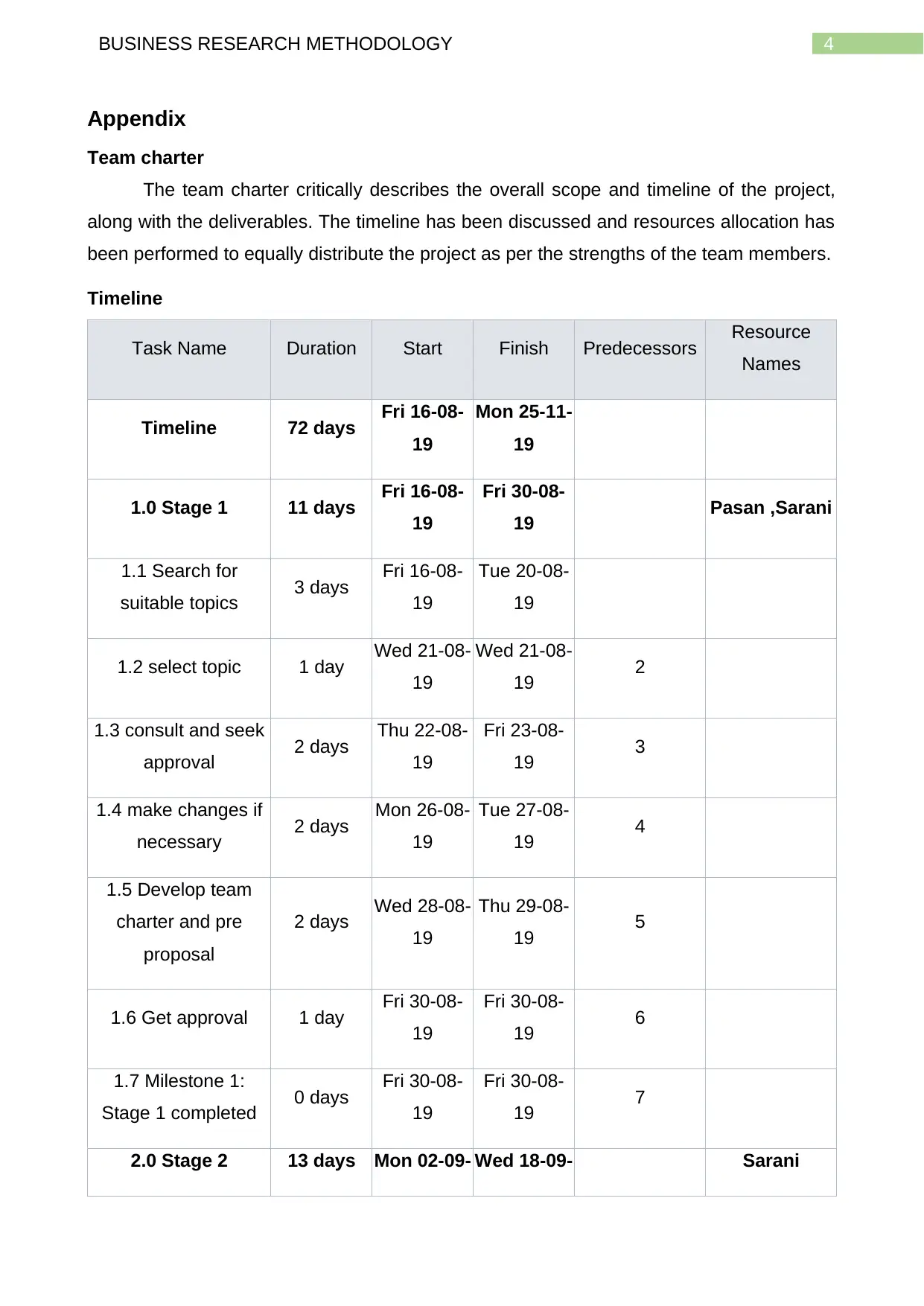
4BUSINESS RESEARCH METHODOLOGY
Appendix
Team charter
The team charter critically describes the overall scope and timeline of the project,
along with the deliverables. The timeline has been discussed and resources allocation has
been performed to equally distribute the project as per the strengths of the team members.
Timeline
Task Name Duration Start Finish Predecessors Resource
Names
Timeline 72 days Fri 16-08-
19
Mon 25-11-
19
1.0 Stage 1 11 days Fri 16-08-
19
Fri 30-08-
19 Pasan ,Sarani
1.1 Search for
suitable topics 3 days Fri 16-08-
19
Tue 20-08-
19
1.2 select topic 1 day Wed 21-08-
19
Wed 21-08-
19 2
1.3 consult and seek
approval 2 days Thu 22-08-
19
Fri 23-08-
19 3
1.4 make changes if
necessary 2 days Mon 26-08-
19
Tue 27-08-
19 4
1.5 Develop team
charter and pre
proposal
2 days Wed 28-08-
19
Thu 29-08-
19 5
1.6 Get approval 1 day Fri 30-08-
19
Fri 30-08-
19 6
1.7 Milestone 1:
Stage 1 completed 0 days Fri 30-08-
19
Fri 30-08-
19 7
2.0 Stage 2 13 days Mon 02-09- Wed 18-09- Sarani
Appendix
Team charter
The team charter critically describes the overall scope and timeline of the project,
along with the deliverables. The timeline has been discussed and resources allocation has
been performed to equally distribute the project as per the strengths of the team members.
Timeline
Task Name Duration Start Finish Predecessors Resource
Names
Timeline 72 days Fri 16-08-
19
Mon 25-11-
19
1.0 Stage 1 11 days Fri 16-08-
19
Fri 30-08-
19 Pasan ,Sarani
1.1 Search for
suitable topics 3 days Fri 16-08-
19
Tue 20-08-
19
1.2 select topic 1 day Wed 21-08-
19
Wed 21-08-
19 2
1.3 consult and seek
approval 2 days Thu 22-08-
19
Fri 23-08-
19 3
1.4 make changes if
necessary 2 days Mon 26-08-
19
Tue 27-08-
19 4
1.5 Develop team
charter and pre
proposal
2 days Wed 28-08-
19
Thu 29-08-
19 5
1.6 Get approval 1 day Fri 30-08-
19
Fri 30-08-
19 6
1.7 Milestone 1:
Stage 1 completed 0 days Fri 30-08-
19
Fri 30-08-
19 7
2.0 Stage 2 13 days Mon 02-09- Wed 18-09- Sarani
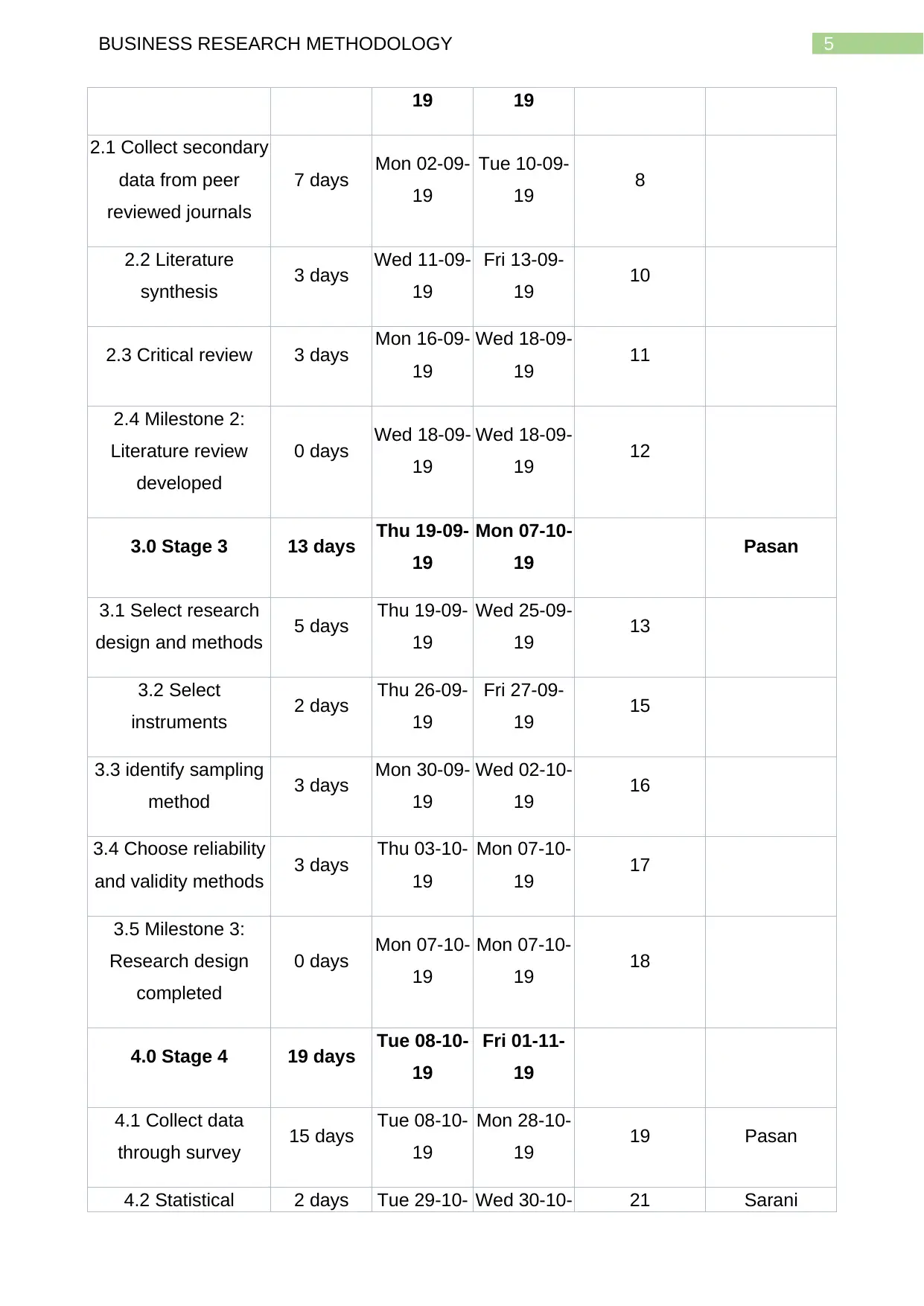
5BUSINESS RESEARCH METHODOLOGY
19 19
2.1 Collect secondary
data from peer
reviewed journals
7 days Mon 02-09-
19
Tue 10-09-
19 8
2.2 Literature
synthesis 3 days Wed 11-09-
19
Fri 13-09-
19 10
2.3 Critical review 3 days Mon 16-09-
19
Wed 18-09-
19 11
2.4 Milestone 2:
Literature review
developed
0 days Wed 18-09-
19
Wed 18-09-
19 12
3.0 Stage 3 13 days Thu 19-09-
19
Mon 07-10-
19 Pasan
3.1 Select research
design and methods 5 days Thu 19-09-
19
Wed 25-09-
19 13
3.2 Select
instruments 2 days Thu 26-09-
19
Fri 27-09-
19 15
3.3 identify sampling
method 3 days Mon 30-09-
19
Wed 02-10-
19 16
3.4 Choose reliability
and validity methods 3 days Thu 03-10-
19
Mon 07-10-
19 17
3.5 Milestone 3:
Research design
completed
0 days Mon 07-10-
19
Mon 07-10-
19 18
4.0 Stage 4 19 days Tue 08-10-
19
Fri 01-11-
19
4.1 Collect data
through survey 15 days Tue 08-10-
19
Mon 28-10-
19 19 Pasan
4.2 Statistical 2 days Tue 29-10- Wed 30-10- 21 Sarani
19 19
2.1 Collect secondary
data from peer
reviewed journals
7 days Mon 02-09-
19
Tue 10-09-
19 8
2.2 Literature
synthesis 3 days Wed 11-09-
19
Fri 13-09-
19 10
2.3 Critical review 3 days Mon 16-09-
19
Wed 18-09-
19 11
2.4 Milestone 2:
Literature review
developed
0 days Wed 18-09-
19
Wed 18-09-
19 12
3.0 Stage 3 13 days Thu 19-09-
19
Mon 07-10-
19 Pasan
3.1 Select research
design and methods 5 days Thu 19-09-
19
Wed 25-09-
19 13
3.2 Select
instruments 2 days Thu 26-09-
19
Fri 27-09-
19 15
3.3 identify sampling
method 3 days Mon 30-09-
19
Wed 02-10-
19 16
3.4 Choose reliability
and validity methods 3 days Thu 03-10-
19
Mon 07-10-
19 17
3.5 Milestone 3:
Research design
completed
0 days Mon 07-10-
19
Mon 07-10-
19 18
4.0 Stage 4 19 days Tue 08-10-
19
Fri 01-11-
19
4.1 Collect data
through survey 15 days Tue 08-10-
19
Mon 28-10-
19 19 Pasan
4.2 Statistical 2 days Tue 29-10- Wed 30-10- 21 Sarani
⊘ This is a preview!⊘
Do you want full access?
Subscribe today to unlock all pages.

Trusted by 1+ million students worldwide
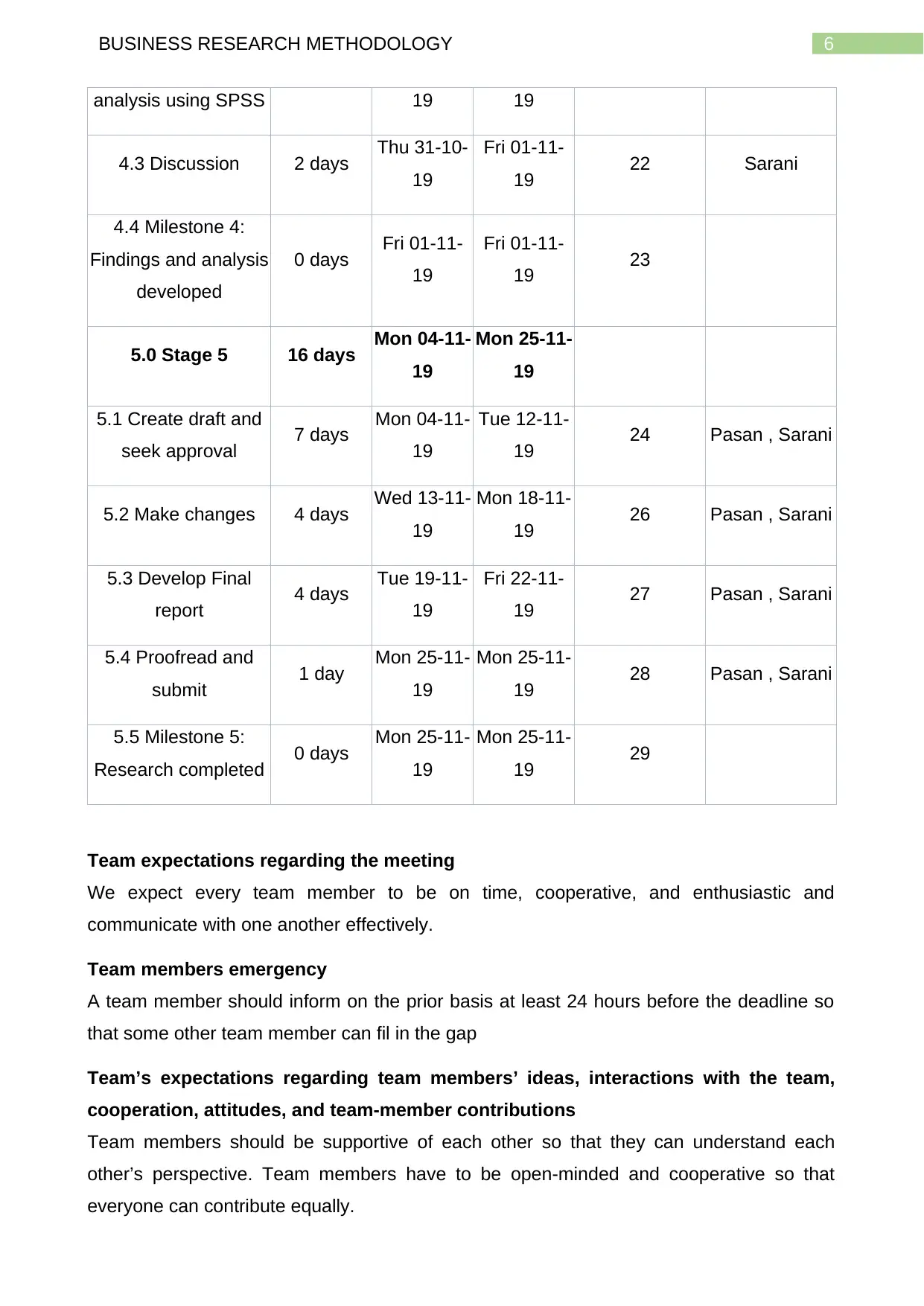
6BUSINESS RESEARCH METHODOLOGY
analysis using SPSS 19 19
4.3 Discussion 2 days Thu 31-10-
19
Fri 01-11-
19 22 Sarani
4.4 Milestone 4:
Findings and analysis
developed
0 days Fri 01-11-
19
Fri 01-11-
19 23
5.0 Stage 5 16 days Mon 04-11-
19
Mon 25-11-
19
5.1 Create draft and
seek approval 7 days Mon 04-11-
19
Tue 12-11-
19 24 Pasan , Sarani
5.2 Make changes 4 days Wed 13-11-
19
Mon 18-11-
19 26 Pasan , Sarani
5.3 Develop Final
report 4 days Tue 19-11-
19
Fri 22-11-
19 27 Pasan , Sarani
5.4 Proofread and
submit 1 day Mon 25-11-
19
Mon 25-11-
19 28 Pasan , Sarani
5.5 Milestone 5:
Research completed 0 days Mon 25-11-
19
Mon 25-11-
19 29
Team expectations regarding the meeting
We expect every team member to be on time, cooperative, and enthusiastic and
communicate with one another effectively.
Team members emergency
A team member should inform on the prior basis at least 24 hours before the deadline so
that some other team member can fil in the gap
Team’s expectations regarding team members’ ideas, interactions with the team,
cooperation, attitudes, and team-member contributions
Team members should be supportive of each other so that they can understand each
other’s perspective. Team members have to be open-minded and cooperative so that
everyone can contribute equally.
analysis using SPSS 19 19
4.3 Discussion 2 days Thu 31-10-
19
Fri 01-11-
19 22 Sarani
4.4 Milestone 4:
Findings and analysis
developed
0 days Fri 01-11-
19
Fri 01-11-
19 23
5.0 Stage 5 16 days Mon 04-11-
19
Mon 25-11-
19
5.1 Create draft and
seek approval 7 days Mon 04-11-
19
Tue 12-11-
19 24 Pasan , Sarani
5.2 Make changes 4 days Wed 13-11-
19
Mon 18-11-
19 26 Pasan , Sarani
5.3 Develop Final
report 4 days Tue 19-11-
19
Fri 22-11-
19 27 Pasan , Sarani
5.4 Proofread and
submit 1 day Mon 25-11-
19
Mon 25-11-
19 28 Pasan , Sarani
5.5 Milestone 5:
Research completed 0 days Mon 25-11-
19
Mon 25-11-
19 29
Team expectations regarding the meeting
We expect every team member to be on time, cooperative, and enthusiastic and
communicate with one another effectively.
Team members emergency
A team member should inform on the prior basis at least 24 hours before the deadline so
that some other team member can fil in the gap
Team’s expectations regarding team members’ ideas, interactions with the team,
cooperation, attitudes, and team-member contributions
Team members should be supportive of each other so that they can understand each
other’s perspective. Team members have to be open-minded and cooperative so that
everyone can contribute equally.
Paraphrase This Document
Need a fresh take? Get an instant paraphrase of this document with our AI Paraphraser
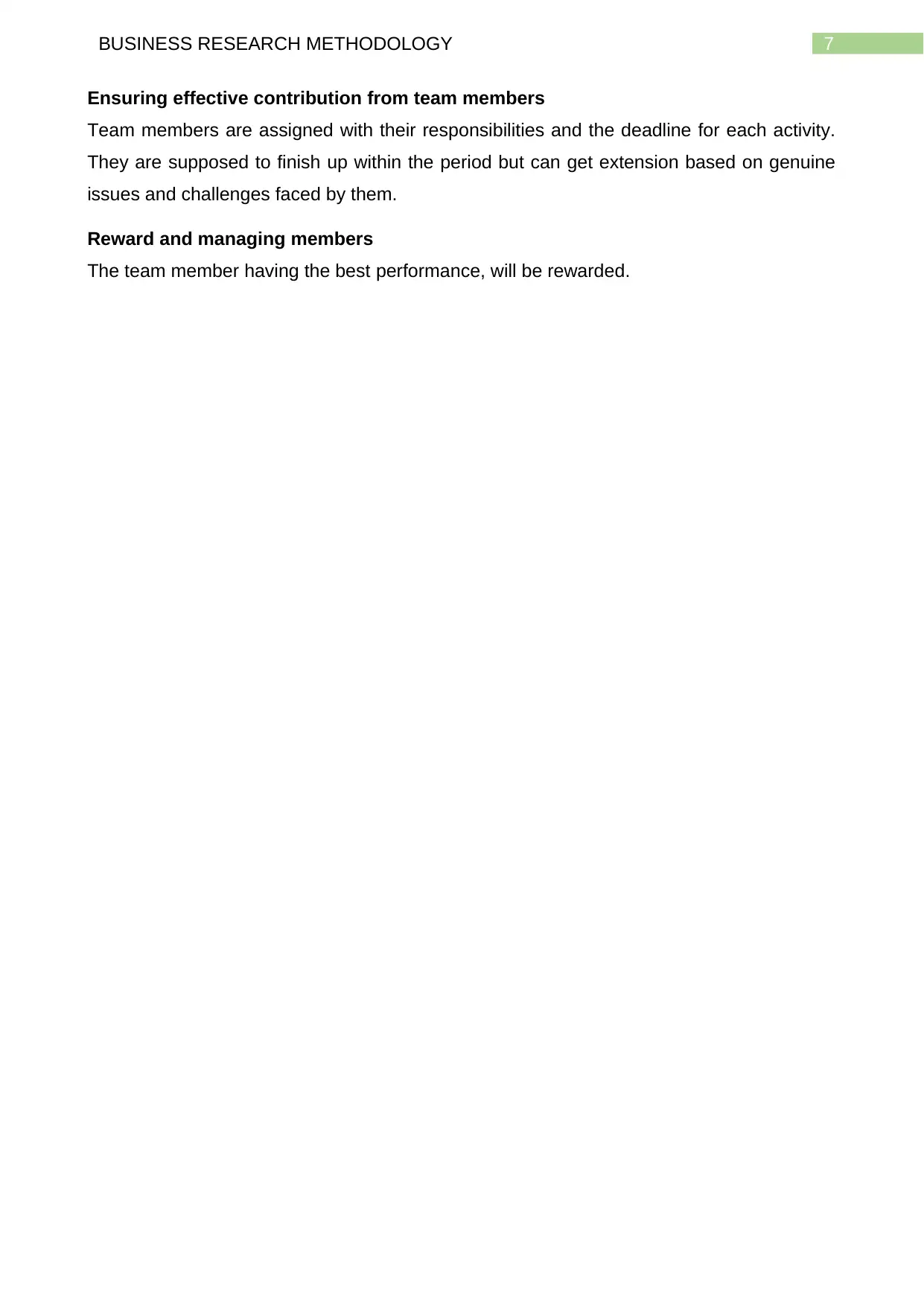
7BUSINESS RESEARCH METHODOLOGY
Ensuring effective contribution from team members
Team members are assigned with their responsibilities and the deadline for each activity.
They are supposed to finish up within the period but can get extension based on genuine
issues and challenges faced by them.
Reward and managing members
The team member having the best performance, will be rewarded.
Ensuring effective contribution from team members
Team members are assigned with their responsibilities and the deadline for each activity.
They are supposed to finish up within the period but can get extension based on genuine
issues and challenges faced by them.
Reward and managing members
The team member having the best performance, will be rewarded.
1 out of 8
Related Documents
Your All-in-One AI-Powered Toolkit for Academic Success.
+13062052269
info@desklib.com
Available 24*7 on WhatsApp / Email
![[object Object]](/_next/static/media/star-bottom.7253800d.svg)
Unlock your academic potential
Copyright © 2020–2026 A2Z Services. All Rights Reserved. Developed and managed by ZUCOL.




